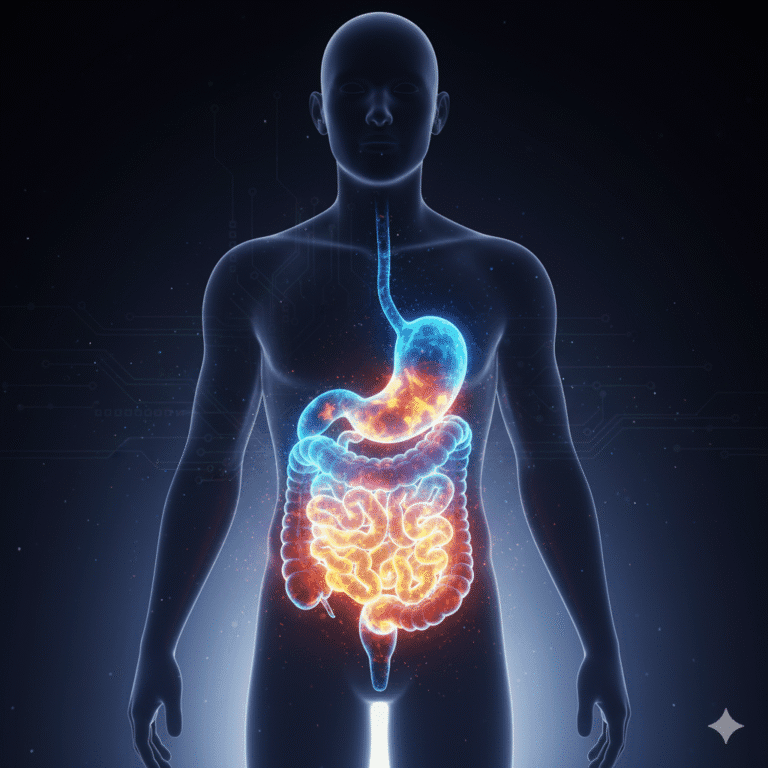My Journey with Crohn’s Disease
Living with Crohn’s Disease is like being handed a puzzle where half the pieces are missing. Since my diagnosis, I’ve tackled challenges that felt as elusive as the cause of the condition itself. Along the way, I’ve uncovered practical ways to manage the symptoms, and I’m here to share insights about the key risk factors for Crohn’s disease to help others navigate this puzzle.
Examining the Causes and Risk Factors of Crohn’s Disease
After my diagnosis, I was left asking the same question most people do: “Why me?” While science has yet to crack the code on what triggers Crohn’s Disease, a closer look reveals several risk factors for Crohn’s disease that are worth understanding. Genetics and environmental exposures carry the most weight. The microbiome influences Crohn’s, and lifestyle choices shape intestinal inflammation triggers. These clues show how biology and environment interact in this condition.
Lifestyle Choices and Their Role in Crohn’s Disease
One aspect that became apparent early on is the significant role lifestyle choices play in managing Crohn’s Disease. Smoking stands out as one of the clearest risk factors for Crohn’s disease, and research connects it with higher rates of chronic inflammation. Quitting wasn’t just a health choice—it was like stepping off a sinking ship before it was too late. Diets high in processed foods may worsen inflammation. Nutrient-dense options can lower intestinal inflammation triggers.

What Science Says About Crohn’s Risk Factors
Scientists have not yet identified the exact cause of Crohn’s Disease, but several factors increase the risk of developing the condition.
The Role of Genetics in Crohn’s Disease
Genetics might hand you the cards, but your lifestyle plays the hand. For instance, a family history of Crohn’s might set the stage.
The Impact of Smoking and Diet
Smoking adds fuel to the fire, while diets high in processed foods could tip the balance in favour of inflammation.
Environmental Triggers and Inflammation
Pollutants, toxins, and microbial agents may act as silent saboteurs. These aren’t just theories—they’re pieces of a bigger picture that might help us one day crack the code on Crohn’s.

How the Microbiome Affects Crohn’s Disease
The gut holds trillions of bacteria essential to health. In Crohn’s Disease, microbiome disruptions spark inflammation and cause flare-ups. Research continues to explore how rebalancing gut bacteria could help manage symptoms and prevent intestinal inflammation triggers.
Environmental Triggers for Crohn’s Disease: What to Know
Environmental factors play a key role in Crohn’s Disease. Pollutants, toxins, and certain microbial agents disrupt the gut microbiome and intensify inflammation tied to the condition. While the exact mechanisms remain unclear, ongoing research continues to highlight how the environment interacts with intestinal inflammation triggers to shape outcomes.
Embracing the Complexity of Disease Pathogenesis
The multifaceted nature of Crohn’s Disease pathogenesis unveils a complex interplay of immune dysregulation, microbial triggers, and genetic predispositions. Moreover, insights into bacterial infections, such as Mycobacterium avium subsp. Paratuberculosis, show how chronic inflammation causes interact with genetics and environmental conditions. These insights also open avenues for addressing disruptions in the gut microbiome, which is central to many Crohn’s symptoms. Yet, amidst the intricacies of disease onset, one undeniable truth emerges—the persistent activation of the immune system perpetuates intestinal inflammation, perpetuating the cycle of Crohn’s Disease progression.
Nurturing Well-being Amidst Uncertainty
Building Resilience Through Self-care
In navigating the uncertainties of Crohn’s Disease, prioritising self-care has been paramount. From embracing mindful eating habits to incorporating regular exercise into my routine, cultivating holistic well-being has proven instrumental in managing symptoms and enhancing quality of life. In addition, nurturing a balance between physical and emotional health helps individuals harness resilience in the face of adversity.
Taking Charge of Your Healthcare
Central to my journey with Crohn’s Disease has been the importance of advocating for informed healthcare decisions. Open dialogue with healthcare providers fosters collaborative treatment planning tailored to individual needs, empowering individuals to actively participate in their care journey. Whether seeking clarification on diagnostic procedures or exploring treatment options, proactive engagement with healthcare professionals fosters a sense of agency and confidence in managing Crohn’s Disease.

Finding Strength in Community Support
Finding solace in community support has been a cornerstone of my journey with Crohn’s Disease. Engaging with peers facing similar challenges cultivates a sense of camaraderie and understanding, fostering resilience amidst the complexities of chronic illness. Through shared experiences and collective empowerment, individuals find strength in unity, navigating the highs and lows of Crohn’s Disease with unwavering support and compassion.
Charting a Path Forward
Empowering Through Knowledge
As I reflect on my journey with Crohn’s Disease, I’m reminded of the transformative power of knowledge. By equipping oneself with a comprehensive understanding of the condition, individuals can navigate the complexities of Crohn’s Disease with confidence and resilience. From staying abreast of emerging research to embracing innovative treatment modalities, proactive engagement with information empowers individuals to chart a path forward guided by informed decision-making.
Embracing Resilience and Hope
Amidst the uncertainties and challenges of Crohn’s Disease, resilience emerges as a guiding beacon of hope. Embracing the resilience inherent within oneself fosters a sense of empowerment and agency, enabling individuals to confront adversity with courage and determination. Through unwavering perseverance and a steadfast commitment to self-care, individuals cultivate resilience as they traverse the intricacies of life with Crohn’s Disease, embracing each day with optimism and fortitude.
Inspiring Action and Advocacy
As I share my experiences and insights, I’m driven by a fervent desire to inspire action and advocacy within the Crohn’s Disease community. By amplifying awareness and fostering dialogue, we can dismantle barriers and ignite transformative change in the landscape of Crohn’s Disease care. Together, we can advocate for equitable access to resources, champion research initiatives, and foster a culture of compassion and inclusivity, ensuring that every individual impacted by Crohn’s Disease receives the support and care they deserve.
Common Questions About Crohn’s Risk Factors
While the exact cause of Crohn’s Disease remains unknown, several factors may increase the risk of developing the condition. These include genetic predisposition, environmental triggers, smoking, dietary factors, and disruptions in the immune system.
There is evidence to suggest that Crohn’s Disease may have a genetic component, as it tends to run in families. Individuals with a family history of the condition may have an increased risk of developing Crohn’s Disease themselves.
While diet alone is not considered the sole cause of Crohn’s Disease, certain dietary factors may influence disease onset and exacerbation. Diets high in sugar, processed foods, and low in fibre have been associated with an increased risk of Crohn’s Disease. Conversely, a diet rich in fruits, vegetables, and whole grains may help reduce the risk.
While research into environmental triggers for Crohn’s Disease is ongoing, exposure to certain environmental factors, such as pollutants, toxins, and microbial agents, may play a role in disease development. However, the specific mechanisms by which these factors contribute to Crohn’s Disease remain to be fully elucidated.
Research shows that smoking significantly increases the risk of Crohn’s Disease. Smokers are more likely to develop the condition than non-smokers. Additionally, smoking may exacerbate symptoms and increase the likelihood of disease complications in individuals already diagnosed with Crohn’s Disease. Quitting smoking is often recommended as a proactive step to reduce the risk and severity of Crohn’s Disease.





